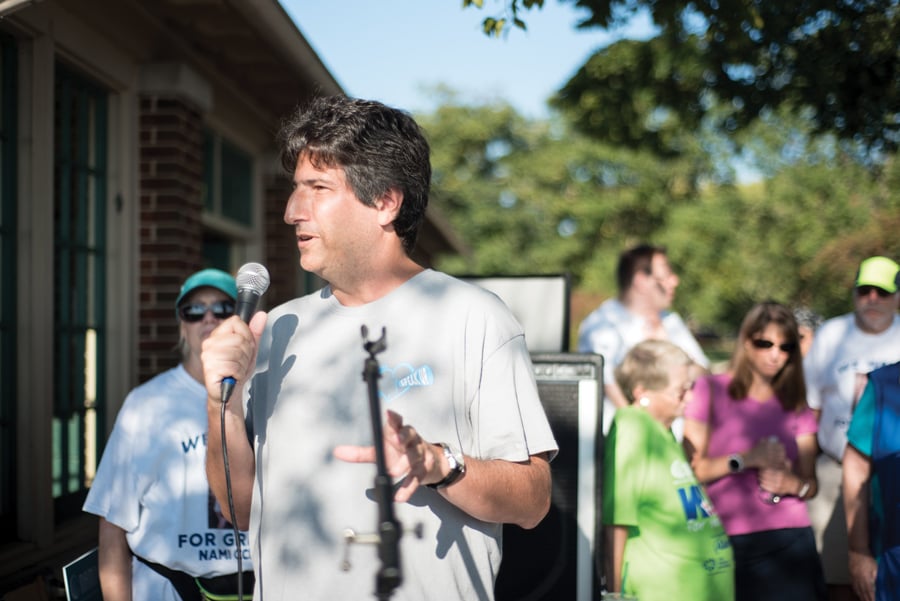Father of NU student who took his own life speaks about mental health at 5k
Colin Boyle/Daily Senior Staffer
Steven Arkin, father of Jason Arkin who took his own life in 2015, gives a speech at the NAMI Cook County North Suburban 5k RUN WALK. The walk, which was located on campus, was held to raise awareness against mental illness stigma.
September 25, 2017
For the first time since his son’s death in May 2015, Steven Arkin stepped onto Northwestern’s campus to speak at a fundraiser Sunday about mental health.
In a speech to participants in the National Alliance on Mental Illness Cook County North Suburban 5k RUN WALK, Steven Arkin stressed the importance of eliminating the stigma surrounding mental illnesses.
Because Jason Arkin was diagnosed with “depression, anxiety and perfectionism,” his father said he wanted to spread awareness about mental health on college campuses.
“I needed to be back here at Northwestern … because what we need to do is to have our young people talk to us,” he said. “It is OK to talk about your illness because that’s the only way you’re going to be treated and live mentally well.”
This was the first time the annual 5k — hosted by NAMI — was held at NU, said Sue Ockerlund, the group’s Cook County North Suburban development director. The event raised about $110,000, which will help NAMI provide free psychological counseling services, she said.
Counseling and Psychological Services executive director John Dunkle, who spoke at the event, said he wants to work with NAMI to create more events to help students manage mental illnesses.
“These types of events really encourage me,” Dunkle said. “I know there’s others out there who are really trying to help. It can’t just be on the counseling center, it can’t just be on mental health professionals — it takes a community to address these issues and reduce stigma.”
Ockerlund said college students especially struggle with suicidal thoughts, but some shy away from getting help because they’re afraid of the negative connotations related with mental illness.
“College kids have tons of problems with suicide,” she said. “We need to make students aware (and) unafraid. So when you can join a movement like this and walk unafraid and end the stigma, that’s what we want to do.”
To combat the ongoing problem with suicide on college campuses, Dunkle told The Daily that CAPS has taught the
“Question. Persuade. Respond.” suicide prevention program for more than four years.
CAPS has also been implementing initiatives to teach students skills that will help them handle crisis situations, he said. It released a new program called “Breathe” on the NU Health app, which teaches students ways to deal with stress and test anxiety.
“There’s a whole host of things that we’re doing to be out there, to hopefully teach skills so that students don’t get to a point of a crisis or, worst case scenario, a suicide crisis,” Dunkle told The Daily.
Steven Arkin said he has been working with the University to help students receive the psychological services they need. He said he advocated for the removal of CAPS’ 12-session limit, which was eliminated Fall Quarter 2016.
Arkin also created the Suicide Prevention Education Awareness for Kids United as Partners Foundation to promote dialogue about mental health in schools.
“We’re getting teachers, administrators, parents to come together so that we can beat these illnesses, so that (my son) doesn’t die in vain,” Arkin said.
Email: [email protected]
Twitter: @ck_525












